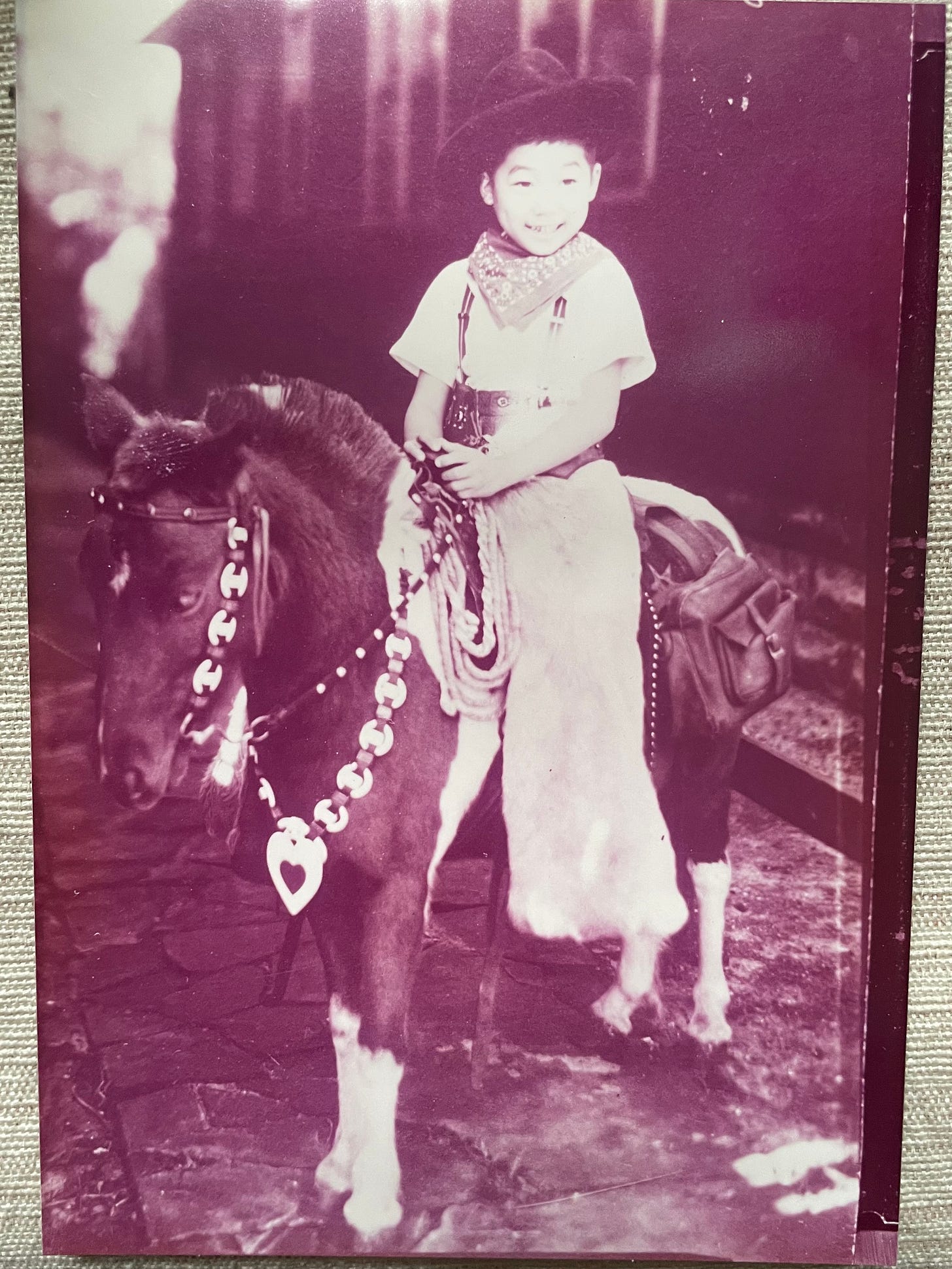My father-in-law, Howard Sugiuchi, passed away in October. I’ve been quiet here, partly because I’ve been processing his death.
I loved my father-in-law very much. I helped take care of him the past past few years of his life. He suffered from Parkinson’s, which is an awful way to go. I’m glad he’s at peace.
I wrote the following remembrance of him with input from my husband, my mother-in-law, and my brother-in-law. He had a fascinating life, high points of which included surviving the internment, outwitting Mississippi miscegenation laws, and speaking out against race-based hatred until the end, most notably in collaboration with the musician Kishi Bashi. I know I skimmed over his career, mainly because I couldn’t even begin to comprehend what he did (sorry Howard!). You’ll just have to take my word. He was brilliant.
Howard, age 6 or 7, after the internment, in Cleveland, Ohio
Howard Sugiuchi, Obituary
Howard Sugiuchi, of Winter Park, Florida and Athens, Georgia, passed away on October 11, 2024. He was 86 years old. Howard, a third generation Japanese American, was born on January 3, 1938 in Long Beach, California. The sixth and youngest child of Francisco Tsuneichi (Frank) and Margaret Hawayo Yagami Sugiuchi, Howard’s life took a sudden turn when, on February 19, 1942 President Franklin D. Roosevelt signed Executive Order 9066, which authorized the military to remove all people of Japanese ancestry from the West Coast and surrounding areas and relocate them to internment camps inland. The order was used to incarcerate approximately 120,000 Japanese Americans, two-thirds of whom were American citizens.
The Sugiuchi family first moved to the Santa Anita Race Track in Arcadia, California, where they were forced to make their home in a horse stall, before being moved to Arkansas, where they lived in a tarpaper shack at the Jerome Relocation Camp. Howard’s primary memories were of roaming the camp and playing on the abandoned guard tower. In 1944, the Sugiuchi family relocated to Cleveland, Ohio. Howard later noted that the family rarely spoke of the camp, and never negatively. They also never tried to recover their land or possessions, and instead focused on moving on with their lives.* He noted how he too carried on this trait, preferring to walk away from confrontation rather than engage.
Once in Cleveland, Howard attended public school, spending much of his youth in the library. He earned a scholarship to Case Institute of Technology, where he ran track and studied physics. After a few years post-graduation working at Massachusetts’ Sylvania Electric Products, Howard was drafted into the military during the Cold War. Soon he was transferred to the U.S. Army Core of Engineers Waterways Experiment Station in Jackson, Mississippi.
While stationed in Mississippi, Howard met and fell in love with Suzanne Sellers, originally of Natchez, who, after graduating from Belhaven, was working at The Brass Key bookstore in Jackson. After a whirlwind romance, Howard and Suzanne eloped to Montgomery, Alabama in July of 1963, making the journey in Howard’s Alfa Romeo. The two were unable to get married in Mississippi because Suzanne was white—due to the state’s miscegenation laws, which weren’t repealed until 1987, white people in Mississippi were not permitted to marry people who were not white and, as Howard was fond of saying, the two had no desire to be a test case.
In 1966, Howard and Suzanne moved to Orlando, Florida with their daughter, Mariko. Their son Scott was born soon after, followed by two more sons, Christopher and Jason. There Howard worked for many years at Martin Marietta Orlando Aerospace, before moving on to SAIC, where he was a senior scientist. He also earned a master's degree in physics at Rollins College. In later years he was a private consultant.
Howard served as an elder at First Presbyterian Church of Orlando for many years. He was an active parent, serving as president of the Hiawassee Elementary PTA and the Meadowbrook Band Booster Club. He also helped organize YMCA Indian Guides and Girl Scouts events.
In 2009, Howard and Suzanne moved part-time to Athens, Georgia, to be near their only grandson, Harvey, and Harvey's parents, Chris and Deirdre. Both Howard and Suzanne were integral in raising Harvey, with Howard coaching Harvey as he ran track and cross-country. He assisted Chris with the Chase Street School Engineering Club, and the two spent many hours working on various automotive and home improvement projects.
After 2001, in the wake of anti-Muslim sentiment resulting from 9/11, Howard, a private person, began speaking out about the danger of race-based hatred. He shared the story of what his family experienced during the internment at schools and churches in Georgia and Florida, at community centers, and in the 2022 documentary by the musician Kishi Bashi, Omoiyari.
Howard was passionate about his family, tennis, politics, and his wife, Suzanne, to whom he was married for 61 years. He was also a visual artist, musician, and a fan of all kinds of music. In his last years he struggled with Parkinson’s. He is survived by Suzanne, his sister Marion Sano (San Jose), his sister Jane Doi (Cleveland, OH), daughter Mari and her husband John Heinsen (Orlando), son Scott and his wife Diana (Santa Fe) and granddaughters Quincy and Daphne, son Chris and his wife, Deirdre (Athens, Georgia) and grandson Harvey, and son Jason and his wife Jessica (Orlando). Howard is loved and missed by his family, friends, and neighbors.
Howard, Suzanne, my son Harvey, me, and my husband a few years ago, at Niagara Falls.
*I love that Howard’s parents, Margaret and Frank, went through what they did and then put their youngest on a pony!




Lovely tribute to a full life! Amazed that they had to go to Alabama to get married, of all places!